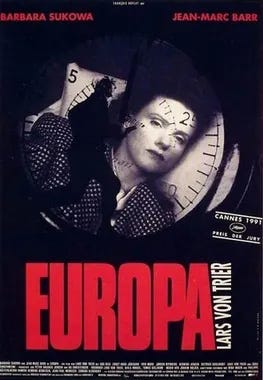Lars Von Trier's 'Europa' – A Hypnotic Descent into Post-War Chaos
A Surreal Masterpiece of Noir, Ideology, and Cinematic Audacity
Welcome to Vintage Cafe, a reader-supported newsletter exploring music, film, books, art, travel, and coffee. By subscribing for just $6 a month, you support independent writing and unlock exclusive content.
They don’t make films like Europa anymore. Even in the early '90s, when Lars von Trier released his visually hypnotic and deeply unsettling third feature, it felt like something pulled from a lost era of cinema—an echo of German Expressionism, classic noir, and political allegory fused with avant-garde experimentation. Watching Europa today is to be reminded of a kind of audacity and craftsmanship that few filmmakers dare attempt. It’s an intoxicating, disorienting, and altogether singular experience that burrows into the subconscious like a half-remembered nightmare.
Von Trier, whose name would later become synonymous with provocation and controversy, was still a young filmmaker here, yet already possessed an uncanny mastery of film language. Europa—known as Zentropa in the U.S. to avoid confusion with Agnieszka Holland’s Europa, Europa—marked the culmination of his Europe Trilogy, following The Element of Crime (1984) and Epidemic (1987). Where those films were bleak, cryptic, and coldly intellectual, Europa is hypnotic and seductive, drawing the viewer into a meticulously crafted world that is both aesthetically breathtaking and morally suffocating.
The film follows Leopold Kessler (Jean-Marc Barr), a young, idealistic American who arrives in post-war Germany in 1945, determined to show kindness and neutrality in a land still reeling from devastation. Through the help of his German uncle (Ernst-Hugo Järegård), Leopold secures a job as a sleeping-car conductor on the Zentropa railway. But nothing in this world is simple. The train itself, a microcosm of shattered Germany, carries passengers of all political persuasions—American occupiers, weary German citizens, and remnants of the Nazi regime still lurking in the shadows. Leopold’s naive desire to remain apolitical is tested at every turn, and his fate becomes entangled with the powerful and enigmatic Katharina Hartmann (Barbara Sukowa), the daughter of Zentropa’s industrialist owner.
Keep reading with a 7-day free trial
Subscribe to Vintage Cafe to keep reading this post and get 7 days of free access to the full post archives.





